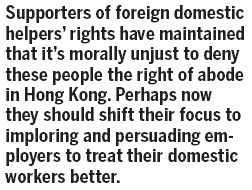Respect domestic helpers' place
Updated: 2013-04-03 05:25
By Hong Liang(HK Edition)
|
|||||||
The contributions foreign (mainly Filipino and Indonesian) domestic helpers make to Hong Kong are seldom questioned. When our daughter was very young, we hired a Filipino maid to care for her. Without her help, either my wife or I would have quit the jobs we loved so much.
I am sure many families with small children are still doing the same. As such, the live-in domestic helpers are very much part of the family. They provide an indispensable service.
We have heard the occasional horror story about maids from hell. We were lucky to have hired one who was dependable and caring. My daughter got along well with her. But she had to leave us after a few years because there was no point her staying too long in a place she could never hope to call home.
Some of us may feel disappointed by the Court of Final Appeal's ruling that denies right of abode to foreign domestic helpers. But we are not in a position to argue against it on legal grounds.
I don't agree with some commentators' extreme opinions that the court's decision is tantamount to a legal sanction of apartheid. That is simply untrue.
Of course, many Hong Kong people are against the idea of granting the right of abode to domestic helpers. That's based more on practical considerations, though exaggerated, that an influx of new immigrants could severely strain our resources, rather than any outright bias against Filipino, or other foreign, domestic workers.
In fact, Hong Kong people are used to sharing public facilities with domestic helpers, especially on Sundays when thousands of them gather in parks, on streets and outside the malls. Indeed, the weekly gatherings of domestic helpers on Chater Road in Central and in Victoria Park have become a local fixture.

Supporters of foreign domestic helpers' rights have maintained that it's morally unjust to deny these people the right of abode in Hong Kong. Perhaps now they should shift their focus to imploring and persuading employers to treat their domestic workers better.
In Hong Kong, there is a handbook for almost everything. The highly resourceful government information department has produced many booklets, most of them helpful, and sometimes entertaining, with illustrations to teach us the proper way of handling different situations. But I have yet to see one which instructs employers how to build a cordial relationship with their domestic helpers, who come from a different cultural background and speak a different language.
Such a relationship can be stressful to both parties given the tight living quarters so common in Hong Kong. A well-prepared guide book would be especially helpful to young families with no previous experience of employing live-in maids.
The existing regulatory framework that specifies employers' obligations is widely seen to be adequate and fair. But it cannot guarantee good relationships that are often of greater benefit to the employer than the employee. This can only be achieved through better understanding, greater tolerance and a willingness to treat domestic helpers with respect.
It is important that we recognize and respect the fundamental rights of domestic helpers, especially in the light of being excluded right of abode in Hong Kong by law.
The author is a current affairs commentator.
(HK Edition 04/03/2013 page9)